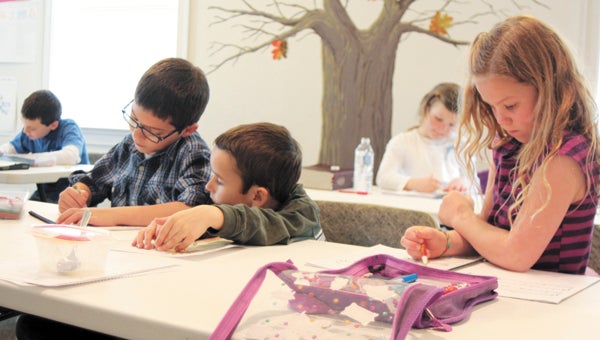A different mission in education
Published 10:43 pm Thursday, March 20, 2014

Vaden Miller, Lincoln Miller, Owen Schroeder, Kaisa Kent and Aven Dalton perform a coloring exercise while listening to a story about the Revolutionary War at the Kimber Academy in North Suffolk on Wednesday.
When the uninitiated enter a new school in North Suffolk, rows of Bibles on the desks are possibly the most obvious indication that this isn’t “school” like most people recognize and understand.
The Bibles aren’t provided by Kimber Academy, said Karen Dayton, owner of the small branch of the organization with 20-odd locations across five states.
And, on closer inspection, some of them may not even turn out to be Bibles:
“They are supposed to bring Bibles — (but) it’s (actually) the scripture of their choice,” Dayton said. “We honor the religion of their choice.”
The self-described “home-school veteran,” who, having used it with her own children, has been familiar with the Kimber Academy curriculum for “20-something years,” opened the academy in a smallish building at Governor’s Pointe’s Shoppes on the Village Green at the beginning of November.
The original plan was to locate the academy in her home city of Chesapeake, Dayton said, before she learned that students would be coming from Holland and Bennett’s Creek in Suffolk, as well as from Franklin.
For a short while, the academy operated out of a martial arts studio on Chesapeake’s Taylor Road, but then Dayton became aware of the Governor’s Pointe location. Other Kimber Academy locations in Virginia are at Gloucester, Mechanicsville and Rockbridge.
Students are home schooled in unison with attending Kimber Academy, whose hours are from 9 a.m. until 2 p.m. on Tuesdays and Thursdays — and sometimes a little later; for private group lessons, for instance — and until 1 p.m. on Wednesdays.
The calendar mirrors a typical public school in terms of semesters and holidays, Dayton said, but the shorter hours and fewer days mean parents still reported to the state as regular home-schoolers, rather than the academy doing so.
Besides the prevalence of Bibles and other religious texts, grade structure is another unique aspect of the Kimber Academy.
There’s a senior class, for ages 11 to 15, and a junior class for younger students sometimes splits into “A” and “B” classes, “depending on where they are in the subject area,” Dayton said.
Each core subject — religion, history, math, science and language arts — is taught from a Christian perspective, with emphasis on God, family and country, according to academy literature.
For instance: “Instead of teaching Godless theories of how mankind evolved, our history curriculum is taken directly from the viewpoint of God’s timeline.” And, “Rather than repetitiously manipulating numbers … the Kimber Math program presents the fundamentals of how God used mathematics to pattern the entire universe.”
Students write their own science textbooks, according to the literature, getting “not only … an intense study of the sciences, but they learn ‘Why’ God created what He did.”
“There are intrinsic values we are really going for, and we use the subjects as tools to get there,” Dayton explained.
Glenn and Julianne Kimber wrote the curriculum. Glenn Kimber had advanced degrees in education and constitutional studies, according to Dayton.
According to the Glenn J. Kimber Academy website, the Kimbers started what was then called the Benjamin Franklin Academy in Arizona in 1991, after Glenn Kimber had returned from Vietnam in 1970 and grown concerned with “negativism toward America,” and then embarked on various activities promoting faith in the constitution and God.
In line with students writing textbooks, Kimber Academy emphasizes self-directed learning.
“It starts with finding out what the student is interested in,” Dayton said. “Some dismiss entire subjects, initially. … We start where they are, and then open doors so they can go off in different directions. We are all about growth, individual learning and enrichment, really.”
Students even determine their own field trips, according to Charleen Chamberlayne, academy administrator, director of math, and dean. “The students review a list of field trip options,” she said, adding information is also sent home with parents, and options are discussed during parent-teacher-student meetings.
Home-school parents come to the academy because it offers them support and guidance as well as the freedom to be in control of their children’s education, according to Dayton.
“We suggest things to do at home, but ultimately it’s their choice,” she said.
Dayton said enrollment is growing month-to-month, with five seniors and nine juniors currently.
The academy could expand into other commercial buildings around the village green at Governor’s Pointe, she said, adding there was also a larger site in Norfolk that the academy could move to “if we get a sudden influx.”
On a 12-month plan, fees are $3,000 annually per student, Dayton said.


